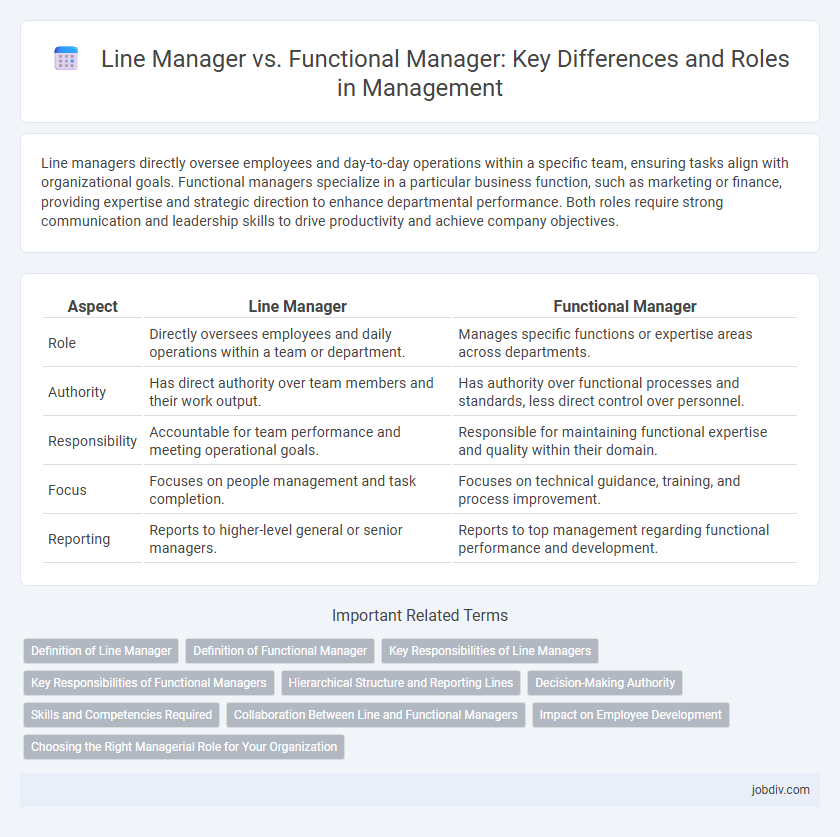Line managers directly oversee employees and day-to-day operations within a specific team, ensuring tasks align with organizational goals. Functional managers specialize in a particular business function, such as marketing or finance, providing expertise and strategic direction to enhance departmental performance. Both roles require strong communication and leadership skills to drive productivity and achieve company objectives.
Table of Comparison
| Aspect | Line Manager | Functional Manager |
|---|---|---|
| Role | Directly oversees employees and daily operations within a team or department. | Manages specific functions or expertise areas across departments. |
| Authority | Has direct authority over team members and their work output. | Has authority over functional processes and standards, less direct control over personnel. |
| Responsibility | Accountable for team performance and meeting operational goals. | Responsible for maintaining functional expertise and quality within their domain. |
| Focus | Focuses on people management and task completion. | Focuses on technical guidance, training, and process improvement. |
| Reporting | Reports to higher-level general or senior managers. | Reports to top management regarding functional performance and development. |
Definition of Line Manager
A line manager is directly responsible for overseeing employees and daily operations within a specific business unit or department, ensuring that organizational goals are met through direct supervision and resource allocation. This role involves managing team performance, addressing personnel issues, and coordinating work activities to achieve operational efficiency. Unlike functional managers who specialize in particular functions such as finance or marketing, line managers have direct authority over frontline staff and are crucial for implementing company policies at the ground level.
Definition of Functional Manager
A Functional Manager is a professional responsible for overseeing a specific department or function within an organization, such as marketing, finance, or operations. Unlike Line Managers who manage employees and daily activities directly contributing to production, Functional Managers focus on expertise, resource allocation, and strategic decisions within their specialized area. Their role involves coordinating cross-functional projects, setting standards, and developing specialized skills to enhance departmental performance.
Key Responsibilities of Line Managers
Line managers are primarily responsible for supervising daily operations, managing team performance, and ensuring the achievement of organizational goals within their specific department. They handle employee development through training, performance appraisals, and motivation to maintain high productivity levels. Line managers also coordinate resource allocation and communication between upper management and operational staff to implement company strategies effectively.
Key Responsibilities of Functional Managers
Functional managers oversee specific departments or specialized functions such as finance, marketing, or operations, ensuring alignment with organizational goals. They are responsible for setting strategic objectives within their function, managing resources, and directing technical expertise to improve efficiency and effectiveness. Key responsibilities include developing functional policies, coordinating cross-functional activities, and monitoring performance metrics to drive continuous improvement.
Hierarchical Structure and Reporting Lines
Line managers directly oversee employees within a specific team or department, holding authority over day-to-day operational tasks and performance management. Functional managers possess specialized expertise and are responsible for managing functions across the organization, often guiding multiple line managers without direct control over their personnel. The hierarchical structure positions line managers within the operational layers, reporting to functional managers who ensure alignment with organizational goals and strategic objectives.
Decision-Making Authority
Line managers possess direct decision-making authority over daily operational tasks and personnel management within their specific teams, ensuring efficient workflow and immediate issue resolution. Functional managers hold decision-making power related to their specialized areas, such as finance, marketing, or IT, shaping strategic directives and policy implementation across multiple projects or departments. Clear delineation between these roles enhances organizational structure by balancing operational control with functional expertise in decision-making processes.
Skills and Competencies Required
Line Managers require strong interpersonal skills, team leadership, and operational problem-solving abilities to effectively manage day-to-day activities and employee performance. Functional Managers need specialized technical expertise, strategic planning capabilities, and cross-departmental coordination skills to drive functional area objectives and innovation. Both roles demand emotional intelligence, decision-making competence, and adaptability to navigate organizational challenges successfully.
Collaboration Between Line and Functional Managers
Effective collaboration between line managers and functional managers enhances organizational performance by combining operational expertise with specialized knowledge. Line managers oversee daily team activities and ensure task completion, while functional managers provide technical guidance and resources within their departments. Coordinated communication and shared goal alignment between these roles drive efficiency and foster innovation in management processes.
Impact on Employee Development
Line managers directly influence employee development through daily supervision, providing immediate feedback, and aligning individual goals with team objectives. Functional managers contribute by offering specialized expertise, facilitating skill-specific training, and ensuring career progression within a particular discipline. Effective collaboration between line and functional managers enhances comprehensive development, blending operational guidance with technical growth.
Choosing the Right Managerial Role for Your Organization
Selecting the appropriate managerial role hinges on organizational structure and objectives, with line managers directly overseeing daily operations and employees to ensure productivity. Functional managers specialize in specific departments or expertise areas, driving specialized strategies and resource allocation within their function. Prioritizing the right role enhances efficiency, accountability, and alignment with company goals in project execution and team leadership.
Line Manager vs Functional Manager Infographic

 jobdiv.com
jobdiv.com